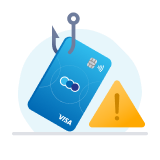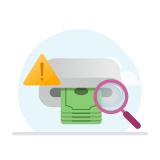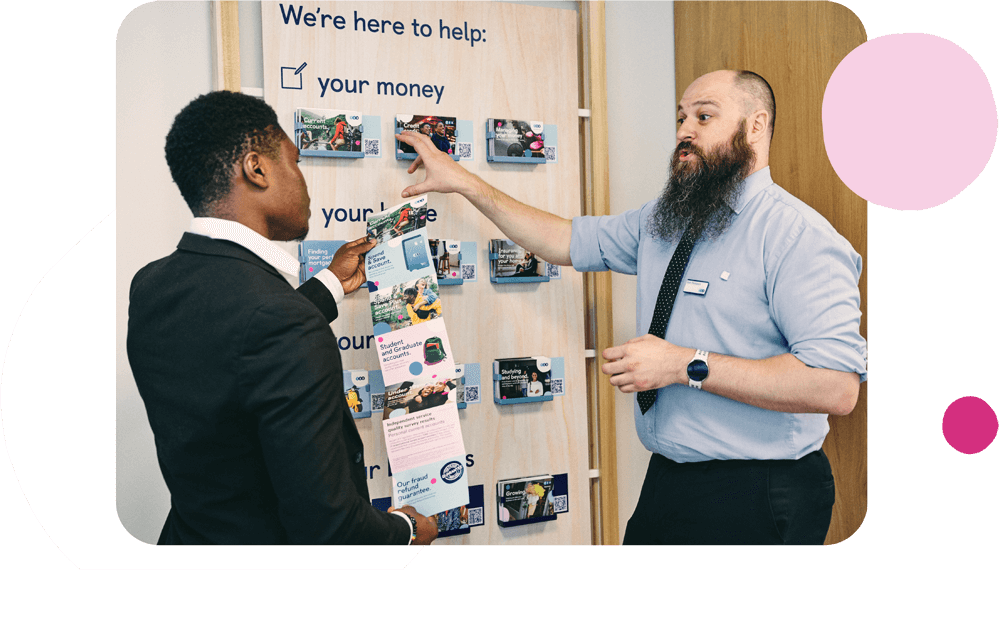Together we can end domestic abuse.
What to do when you've been scammed

"It’s important that we all report fraud, keep clear notes on what we’ve seen, and do our part to protect customers and society. There is no judgment when raising scams—we are here to help."
Richard Daniels, Fraud and Financial Crime Director
Scams are becoming more sophisticated every day, and in the digital world, it’s easier than you might think to be caught off guard. You might receive a convincing message that looks like it’s from your bank, or pay for something online that never turns up. It’s completely understandable to feel upset, confused, or even embarrassed in situations like these.
If this happens to you, try not to worry – you're not alone, and there are steps you can take. Every year, many people across the UK experience scams, often through no fault of their own. What’s most important is how you respond.
This guide is here to support you and tell you what to do when you’ve been scammed online and over the phone. It will walk you through what to do next, how to protect your finances, and how to lower the chances of it happening again.

How to confirm you’ve been scammed online or over the phone
Signs of a scam
- Unexpected calls, texts, or emails from unknown sources.
- Requests for money upfront or for personal or financial information.
- Offers that seem too good to be true.
- Payment requests through unusual methods like gift cards, wire transfers, or cryptocurrency.
Common types of scam
- Phishing and smishing: Messages that trick you into giving away personal data.
- Online shopping scams: Fake retailers or sellers who take your payment but never deliver the goods.
- Identity theft and card fraud: Using your details to open accounts or make purchases.
- Romance scams: Emotional manipulation that leads to requests for money.
- Fake job offers: Fraudulent roles asking for fees or personal information.
Learn more about how to spot these and other scams with our blog on 5 scams to watch out for.
Emotional manipulation
Scammers often try to tap into our emotions – creating a sense of urgency, fear, or even excitement – to encourage quick decisions. Being aware of these emotional tactics can help you take a step back, think things through, and avoid acting on impulse. Simply recognising these signs is a powerful first step toward staying in control.
“I’ve been scammed what do I do?”
If you suspect you’ve been caught in a scam, the first thing to do is stop all contact with the person or organisation involved. Block their email address, phone number, and any social media accounts they may have used. Don’t respond to any further messages, even if they seem threatening or demand more money.
Once you’ve taken a step back, reaching out to someone you trust can really help you feel less alone and give you space to process what’s happened. From there, you can begin to take control of the situation. Here are some important steps to help you protect yourself and start moving forward.
Protect your personal information
- Change your passwords, especially for email, banking, and shopping sites.
- Update security questions and enable two-factor authentication where possible.
- Contact your bank to freeze affected accounts or cards.
Record all evidence
- Take screenshots, save emails, and write down any details you remember, such as names, phone numbers, conversations, and transaction records. This information can help your bank and the authorities investigate the scam.
Report the scam and help others
- Report the fraud to your bank so they can take action. You can also reach out to the Fraud Prevention Team for direct support.
- You can also report to Report Fraud, the UK’s national reporting centre for fraud and cybercrime.
- Email TSB at emailscams@tsb.co.uk to report what happened. Sharing your experience helps us spot patterns and work to stop the fraudsters.
Contact your network
Scammers often target people in your circle using your details. Let friends and family know what happened so they can be alert too. This is especially important if your email or social media accounts were hacked into and compromised.

Dealing with financial loss from a scam
Assessing the financial impact
Take a moment to look over your recent bank statements and credit report at your own pace. Keep an eye out for anything that seems unfamiliar or out of place – even small or unexpected transactions can sometimes be early signs of a scam. Noticing these details early can make a big difference.
Worried about a transaction?
If you notice anything unusual with your account, please get in touch with us as soon as you can. The sooner we hear from you, the more we can do to help protect your account and try to recover any money that may have been lost. We're here to help and will support you every step of the way.
Seeking professional help
If the scam has had an impact on your finances, you don’t have to face it alone. It might be helpful to speak with:
- TSB, we’re here to help, with experts available to support and guide you.
- A legal expert, especially if the scam involved contracts or employment (depending on how complex the scam was).
- Consumer protection organisations that specialise in supporting people through fraud.
And if you’re feeling unsure about a payment, it’s always best to check sooner rather than later – we’re here to help. Get help with a transaction now.
Going through a scam can feel overwhelming and take a real toll on your wellbeing. Reaching out to someone you trust to talk about it can make a big difference. If you’d like to talk to someone who understands, kind and non-judgemental support is available through helplines such as Mind and Victim Support.

How to prevent scams in the future
Secure your digital presence
- Use strong, unique passwords for every account and don't use the same password across different websites.
- Enable two-factor authentication.
- Keep antivirus and anti-malware software up to date.
- Make social media profiles private and be cautious not to overshare personal info that can be used against you by criminals.
Stay educated
Scammers constantly evolve their tactics. Stay alert by:
- Being cautious about sharing information online.
- Checking your financial accounts regularly.
- Monitoring your credit file for any changes.
Visit our Fraud Prevention Centre to stay up to date.
Spotting red flags early
Before engaging with unknown individuals or businesses:
- Research them thoroughly.
- Read reviews and check for verified contact information.
- Avoid responding to unsolicited contact asking for personal details.
Encourage family and friends to stay safe
Scammers sometimes target people who may be less familiar with technology, including older adults. Sharing what you’ve learned with friends and family can be a thoughtful way to help them stay safe online and feel more confident. Even a quick conversation can make a big difference.
Keep your hard-earned cash safe and sound with our 5-step security check.

Final thoughts
We know that discovering you’ve been scammed can be deeply upsetting, and it’s completely natural to feel overwhelmed. But taking action, even small steps, can really help. By following the guidance here, you’ll be in a stronger position to limit the impact, begin your recovery, and feel more protected moving forward.
What to remember:
- Scams are getting smarter
Scams are getting more clever, but there are simple steps you can take to protect yourself. - Emotions can cloud judgement
Scammers often try to make you feel rushed, scared, or excited so you act without thinking. Knowing this can help you stay calm and in control. - Act quickly if you’re targeted
If you think you’ve been scammed, don’t hesitate. Save any evidence you have, report it, and reach out to your bank for support. - Monitor your accounts closely
Keep an eye on your bank statements and credit reports for anything unusual, even small transactions. - Help protect those around you
Talk openly with friends and family, especially if they might be more at risk, and share what you’ve learned to help keep them safe too. - Support is available
If you need help, you can always get support with a transaction here.
Keep yourself informed, stay mindful of potential risks, and remember - you’re never alone. Support is always available whenever you need it.
Speak to a Money Confidence Expert
Whether you bank with us or not, we’re here to make banking better for everybody. Our goal is to help you get more from your money. And chatting to us is completely free.

